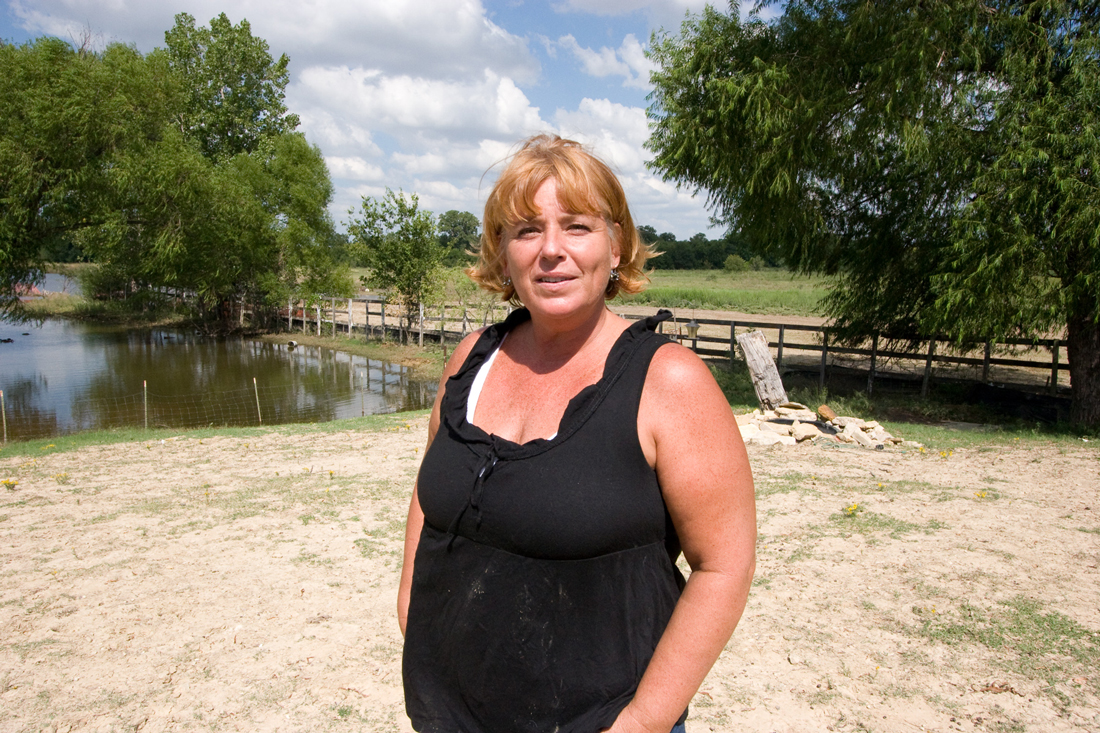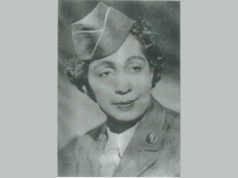A company that failed to get a zoning change on a piece of Eastside land last year — which would have permitted Chesapeake Energy to build one of the largest urban natural gas compressor stations in the country — is trying again.
Two Ponds Inc., which owns the 41-acre property on Randol Mill Road, was turned down last December when it asked to have the land rezoned from its current classification, which permits primarily retail uses, to a similar designation only for gas compressors, to allow Chesapeake to build its station.
This time around, the owners are seeking agricultural zoning, a rollback that usually implies less intense use of land, not more intense. However, thanks to Fort Worth’s controversial gas well ordinance, agricultural zoning in this case would allow Chesapeake to build its compressor complex without having to seek any further city approval.
The city’s zoning commission turned down Two Ponds’ request on Aug. 8. The owners are scheduled to appeal that decision to the city council in September.
“The city’s land-use chart shows that gas line compressors are only allowed by special exception,” which requires approval of the Board of Adjustment, said Mary Kelleher, who owns 12 acres adjacent to the Two Ponds’ site. “But the reality,” she said, “is that on land zoned for agriculture, you don’t need approval.”
Why? Approval for compressor stations in agricultural zones (as well as on industrially zoned land) was written into the Fort Worth gas drilling ordinance in 2006.
It might sound like a technicality, but it’s very real to Eastside residents. Kelleher and her neighbors fear that if Chesapeake is allowed to put 15 compressors — which take natural gas from well heads and compress it so that it can be sent through interstate lines — on the Two Ponds land, their home values will plummet, their health will be affected by escaping benzene and other carcinogens, and they will be subjected to constant noise. A 15-compressor complex would be twice the capacity of the largest compressor station run by the largest gas driller in the country — and even that one, with eight compressors, is in a rural area.
“None of us bought homes here thinking that we’d be living next to an industrial park,” said Kelleher. “And we don’t think it’s OK for Two Ponds and Chesapeake to make millions while our homes are devalued and our health deteriorates.”
In the initial zoning hearing before the city council last December, Chesapeake, through its subsidiary, Texas Midstream Gas Services, insisted that mineral owners have the legal right to maximize their profits from those minerals, which Midstream officials said could be done only if the compressor station is built. The council rejected that argument largely because 75 percent of the 2,000 nearby residents of the Mallard Cove and River Trails neighborhoods signed a petition opposing the zoning change.
Residents are hopeful that the council will again abide by the zoning commission’s recent ruling but are still wary. “We don’t want to take any chances,” said Kelleher, “so we’ll show up in force at the council meeting on Sept. 11 … to let the council know how important this is to us.”
City public information officer Bill Begley said, “It only happens once or twice a year that the council goes against what zoning recommends. But while it’s rare, it does happen.”
Even if the city council denies the request for rezoning, the folks on Randol Mill and in nearby communities are not necessarily out of the woods. In the immediate vicinity of the Two Ponds land are several other properties totaling about 150 acres that are already zoned for agriculture. One 20-acre property has already been put under contract by a business associate of the Two Ponds Inc. owners, and some residents are worried that the property is a fallback plan for the compressor station.
But Julie Wilson, spokesperson for Chesapeake, denied that in an e-mail. “Neither Chesapeake Energy nor TMGS [Texas Midstream Gas Services] has any plans to use this site for a compressor station and are unaware of the owner’s plans for the property,” she wrote.
“I don’t think the city council is going to make the zoning change,” said Gary Hogan, longtime community activist and a member of both of Fort Worth’s gas well ordinance committees. “I’m optimistic that there will be a large enough turnout of people who object to it that it won’t pass.”
Hogan noted that if Two Ponds had tried to go for the agricultural zoning last year, the change might have “slipped under everyone’s radar without knowing the plan was to put compressors in there.”
Jerry Lobdill, a retired physicist and ardent opponent of urban gas drilling, isn’t so sure that strategy would have slipped through last year. Regardless, he said, “It certainly is not going unnoticed now. I’m surprised they’re even trying this end run. It’s just transparent and outrageous.”
Lobdill said that a compressor station built that close to a neighborhood would be disastrous for the health of residents. Compressors, he said, by their very nature, leak, and the leaking gas contains carcinogens and other dangerous chemicals. “There is a reason these huge stations … are generally put way out in the country, away from where people are. Whenever they are near homes, incidents of cancer and other diseases shoot up. Look at DISH” — a tiny North Texas town with eight compressors near dozens of homes — “and the people who are sick there. It’s early to see cancer there yet, but people are already suffering from other major health problems.”
Former DISH Mayor Calvin Tillman, who fought the drillers’ invasion of his town (“Sacrificed to the Shale,” Oct. 14, 2009), finally had to sell his home at a loss and move away because his children were getting sick and having massive nosebleeds. Since they relocated, Tillman said, there’s not been a single nosebleed.
He called it incredible that Fort Worth would consider allowing a large compressor station in the city.
Eventually, he said, people are going to realize the health threat they face “and they’ll move out of Fort Worth. That’s how bad it really is.”
“I hope the council will stand up for us,” said Kelleher. “And I hope they quickly fix the zoning so that there is no automatic right to build a compressor station like this in a residential neighborhood on land that zoned for agriculture.”
If not, she said, “Our health and safety would be jeopardized, our homes would lose their values … . Basically, life as we know it would change very quickly.”













An excellent article. I would add this. As cities with zoning powers grow they annex open land and zone it usually with the least restrictive zoning category that makes sense. As land use becomes more intensive and highest and best use changes, the zoning restrictions become more restrictive–not less. In this case the surrogate owner applying for a rollback from PD to AG is asking for a less restrictive zoning. At the hearing before the Fort Worth Zoning Commission their hired advocate, a man with long experience in zoning matters, stated that in all his years this was the first time he had ever had a client who wanted a less restrictive zoning.
We will fight them again!!! Stay out of our neighborhoods and away from our residents, schools and farms!!!! GO AWAY!!!! Mary is a wonderful lady who should not have to be fighting like this to live in peace on her farm. It’s all about the money!!!!! I wish they would leave Ft Worth alone, you have been drilling for years here now and it is time to move on. I never thought I would say this but Dallas has more sense than Ft Worth because they do not allow these wells in the city!!!!!
Wish it were true. Unfortunately, the gas operators managed to pull a fast one back in 2007 by paying out $34 Million to the City for gas leases on various parcels around town. It was all done without transparency and back then it surely seemed like a good deal. That’s what Dallas is deciding now…after 2 years of debate and a year-long look at getting a rock-solid Gas Drilling Ordinance via a Gas Drilling Advisory group. No drilling and fracking, yet. It’s a boondogle, for sure.
I’m all for gas production and supplying our own fuel supply for the future. But it has to be done in a responsible manner using common sense and morality. Putting a 15-unit compressor station 1,000 feet from a neighborhood shows how little Chesapeake cares about ordinary citizens. There’s lots of open land in Tarrant County and surely you can find a place that won’t destroy people’s home values and health. Forget about this area. I don’t live there but I know some that do and I know you’re in for a long long fight if you insist on this absurdity.
As President of River Trails (one of the many neighborhoods that banded together & are now in alliance with The Historic Randol Mill Valley Alliance), I am very proud of our residents who turned out in numbers last night at city council.
Through all of this ordeal, we became a closer-knit community with friends outside of our neighborhood, and this year we are even closer & stronger. We have resolve, we will not go away or back down! Honestly, there are options for Chesapeake to put this elsewhere, away from homes. We support them locating a more suitable location for their industrial processes-just keep it away from homes & families.
Hi, I have an article that I think would be perfect for your website. It has to do with noise from local gas compression stations in Fort Worth and a violation of contract. It has not been posted anywhere else online, we’re trying to find a suitable website to publish it. Are you interested? I can send the article in its entirety, we were hoping to have it published around the 20th if possible.
Thanks
Josh